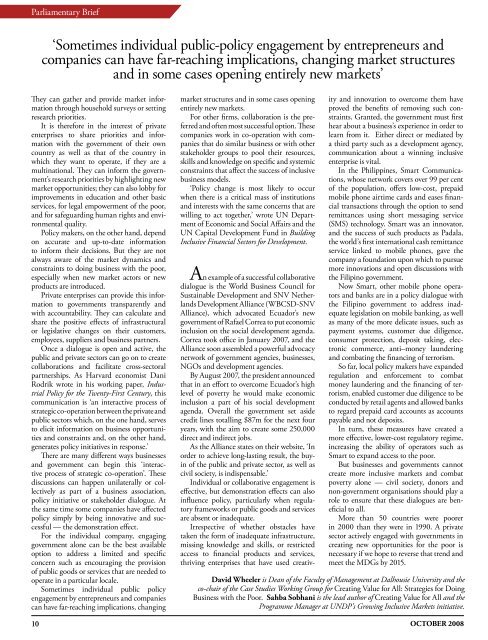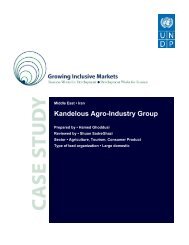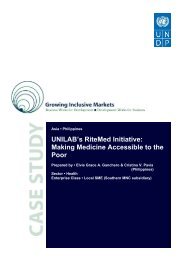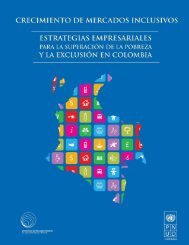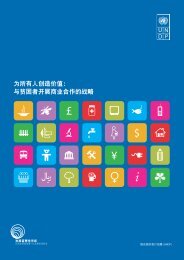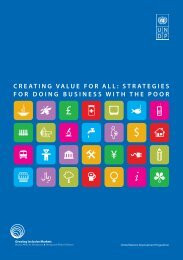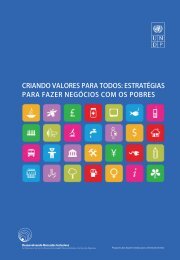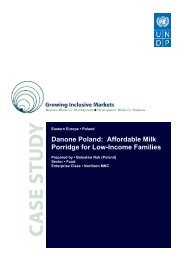Meet the consumer today's business needs to targe
Meet the consumer today's business needs to targe
Meet the consumer today's business needs to targe
- No tags were found...
You also want an ePaper? Increase the reach of your titles
YUMPU automatically turns print PDFs into web optimized ePapers that Google loves.
Parliamentary Brief‘Sometimes individual public-policy engagement by entrepreneurs andcompanies can have far-reaching implications, changing market structuresand in some cases opening entirely new markets’They can ga<strong>the</strong>r and provide market informationthrough household surveys or settingresearch priorities.It is <strong>the</strong>refore in <strong>the</strong> interest of privateenterprises <strong>to</strong> share priorities and informationwith <strong>the</strong> government of <strong>the</strong>ir owncountry as well as that of <strong>the</strong> country inwhich <strong>the</strong>y want <strong>to</strong> operate, if <strong>the</strong>y are amultinational. They can inform <strong>the</strong> government’sresearch priorities by highlighting newmarket opportunities; <strong>the</strong>y can also lobby forimprovements in education and o<strong>the</strong>r basicservices, for legal empowerment of <strong>the</strong> poor,and for safeguarding human rights and environmentalquality.Policy makers, on <strong>the</strong> o<strong>the</strong>r hand, dependon accurate and up-<strong>to</strong>-date information<strong>to</strong> inform <strong>the</strong>ir decisions. But <strong>the</strong>y are notalways aware of <strong>the</strong> market dynamics andconstraints <strong>to</strong> doing <strong>business</strong> with <strong>the</strong> poor,especially when new market ac<strong>to</strong>rs or newproducts are introduced.Private enterprises can provide this information<strong>to</strong> governments transparently andwith accountability. They can calculate andshare <strong>the</strong> positive effects of infrastructuralor legislative changes on <strong>the</strong>ir cus<strong>to</strong>mers,employees, suppliers and <strong>business</strong> partners.Once a dialogue is open and active, <strong>the</strong>public and private sec<strong>to</strong>rs can go on <strong>to</strong> createcollaborations and facilitate cross-sec<strong>to</strong>ralpartnerships. As Harvard economist DaniRodrik wrote in his working paper, IndustrialPolicy for <strong>the</strong> Twenty-First Century, thiscommunication is ‘an interactive process ofstrategic co-operation between <strong>the</strong> private andpublic sec<strong>to</strong>rs which, on <strong>the</strong> one hand, serves<strong>to</strong> elicit information on <strong>business</strong> opportunitiesand constraints and, on <strong>the</strong> o<strong>the</strong>r hand,generates policy initiatives in response.’There are many different ways <strong>business</strong>esand government can begin this ‘interactiveprocess of strategic co-operation’. Thesediscussions can happen unilaterally or collectivelyas part of a <strong>business</strong> association,policy initiative or stakeholder dialogue. At<strong>the</strong> same time some companies have affectedpolicy simply by being innovative and successful— <strong>the</strong> demonstration effect.For <strong>the</strong> individual company, engaginggovernment alone can be <strong>the</strong> best availableoption <strong>to</strong> address a limited and specificconcern such as encouraging <strong>the</strong> provisionof public goods or services that are needed <strong>to</strong>operate in a particular locale.Sometimes individual public policyengagement by entrepreneurs and companiescan have far-reaching implications, changing10market structures and in some cases openingentirely new markets.For o<strong>the</strong>r firms, collaboration is <strong>the</strong> preferredand often most successful option. Thesecompanies work in co-operation with companiesthat do similar <strong>business</strong> or with o<strong>the</strong>rstakeholder groups <strong>to</strong> pool <strong>the</strong>ir resources,skills and knowledge on specific and systemicconstraints that affect <strong>the</strong> success of inclusive<strong>business</strong> models.‘Policy change is most likely <strong>to</strong> occurwhen <strong>the</strong>re is a critical mass of institutionsand interests with <strong>the</strong> same concerns that arewilling <strong>to</strong> act <strong>to</strong>ge<strong>the</strong>r,’ wrote UN Departmen<strong>to</strong>f Economic and Social Affairs and <strong>the</strong>UN Capital Development Fund in BuildingInclusive Financial Sec<strong>to</strong>rs for Development.An example of a successful collaborativedialogue is <strong>the</strong> World Business Council forSustainable Development and SNV Ne<strong>the</strong>rlandsDevelopment Alliance (WBCSD-SNVAlliance), which advocated Ecuador’s newgovernment of Rafael Correa <strong>to</strong> put economicinclusion on <strong>the</strong> social development agenda.Correa <strong>to</strong>ok office in January 2007, and <strong>the</strong>Alliance soon assembled a powerful advocacynetwork of government agencies, <strong>business</strong>es,NGOs and development agencies.By August 2007, <strong>the</strong> president announcedthat in an effort <strong>to</strong> overcome Ecuador’s highlevel of poverty he would make economicinclusion a part of his social developmentagenda. Overall <strong>the</strong> government set asidecredit lines <strong>to</strong>talling $87m for <strong>the</strong> next fouryears, with <strong>the</strong> aim <strong>to</strong> create some 250,000direct and indirect jobs.As <strong>the</strong> Alliance states on <strong>the</strong>ir website, ‘Inorder <strong>to</strong> achieve long-lasting result, <strong>the</strong> buyinof <strong>the</strong> public and private sec<strong>to</strong>r, as well ascivil society, is indispensable.’Individual or collaborative engagement iseffective, but demonstration effects can alsoinfluence policy, particularly when regula<strong>to</strong>ryframeworks or public goods and servicesare absent or inadequate.Irrespective of whe<strong>the</strong>r obstacles havetaken <strong>the</strong> form of inadequate infrastructure,missing knowledge and skills, or restrictedaccess <strong>to</strong> financial products and services,thriving enterprises that have used creativityand innovation <strong>to</strong> overcome <strong>the</strong>m haveproved <strong>the</strong> benefits of removing such constraints.Granted, <strong>the</strong> government must firs<strong>the</strong>ar about a <strong>business</strong>’s experience in order <strong>to</strong>learn from it. Ei<strong>the</strong>r direct or mediated bya third party such as a development agency,communication about a winning inclusiveenterprise is vital.In <strong>the</strong> Philippines, Smart Communications,whose network covers over 99 per cen<strong>to</strong>f <strong>the</strong> population, offers low-cost, prepaidmobile phone airtime cards and eases financialtransactions through <strong>the</strong> option <strong>to</strong> sendremittances using short messaging service(SMS) technology. Smart was an innova<strong>to</strong>r,and <strong>the</strong> success of such products as Padala,<strong>the</strong> world’s first international cash remittanceservice linked <strong>to</strong> mobile phones, gave <strong>the</strong>company a foundation upon which <strong>to</strong> pursuemore innovations and open discussions with<strong>the</strong> Filipino government.Now Smart, o<strong>the</strong>r mobile phone opera<strong>to</strong>rsand banks are in a policy dialogue with<strong>the</strong> Filipino government <strong>to</strong> address inadequatelegislation on mobile banking, as wellas many of <strong>the</strong> more delicate issues, such aspayment systems, cus<strong>to</strong>mer due diligence,<strong>consumer</strong> protection, deposit taking, electroniccommerce, anti–money launderingand combating <strong>the</strong> financing of terrorism.So far, local policy makers have expandedregulation and enforcement <strong>to</strong> combatmoney laundering and <strong>the</strong> financing of terrorism,enabled cus<strong>to</strong>mer due diligence <strong>to</strong> beconducted by retail agents and allowed banks<strong>to</strong> regard prepaid card accounts as accountspayable and not deposits.In turn, <strong>the</strong>se measures have created amore effective, lower-cost regula<strong>to</strong>ry regime,increasing <strong>the</strong> ability of opera<strong>to</strong>rs such asSmart <strong>to</strong> expand access <strong>to</strong> <strong>the</strong> poor.But <strong>business</strong>es and governments cannotcreate more inclusive markets and combatpoverty alone — civil society, donors andnon-government organisations should play arole <strong>to</strong> ensure that <strong>the</strong>se dialogues are beneficial<strong>to</strong> all.More than 50 countries were poorerin 2000 than <strong>the</strong>y were in 1990. A privatesec<strong>to</strong>r actively engaged with governments increating new opportunities for <strong>the</strong> poor isnecessary if we hope <strong>to</strong> reverse that trend andmeet <strong>the</strong> MDGs by 2015.David Wheeler is Dean of <strong>the</strong> Faculty of Management at Dalhousie University and <strong>the</strong>co-chair of <strong>the</strong> Case Studies Working Group for Creating Value for All: Strategies for DoingBusiness with <strong>the</strong> Poor. Sahba Sobhani is <strong>the</strong> lead author of Creating Value for All and <strong>the</strong>Programme Manager at UNDP’s Growing Inclusive Markets initiative.OCTOBER 2008


